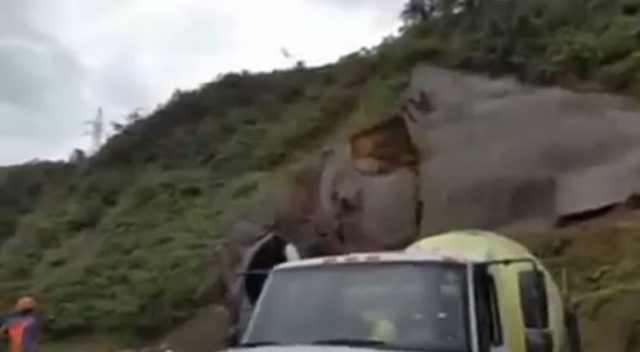5 June 2016
Three interesting new landslide videos – Colombia, Hechi in China and Anatolia in Turkey
Posted by Dave Petley
Colombia landslide video
During my work and travel-induced blog hiatus over the last fortnight, three new landslide videos have appeared on Youtube, from Hechi in China, Anatolia in Turkey and Colombia. None of the three provide much information. The first is apparently from Colombia, showing the collapse of a reinforced slope adjacent to a tunnel portal. The latter is destroyed in the landslide:-
.
I know no more about this landslide, but would observe that the reinforcement of the slope looks to be completely inadequate for the magnitude of the excavation. The failure seems to start directly above the tunnel portal, and then to propagate along the slope:-

Colombia landslide on tunnel portal, via Youtube
.
A classic earth flow in Hechi, China
The second is a beautiful earth flow landslide on a road in Hechi, located in Guangxi Zhuang Autonomous Region in southern China:
.
The beauty of this landslide video is the way that it picks out the way in which the soil, that appears to be unsaturated, develops classic flow-like patterns. The occupants of the vehicles at the foot of the slope were extremely fortunate that the material was not more mobile.
A truck falling down a landslide tension crack
And finally, from Turkey a rather amazing video of a large articulated truck getting caught in a translational landslide, and falling down into the rapidly developing tension crack:
.
Note that the slope can be seen to be moving under the truck. It appears that the cab was sitting across the lateral shear of the landslide – as the slope moved outwards a tension crack opened, into which the truck could fall. According to the Daily Mail, this landslide occurred in a quarry in Tunceli province, which is in the Anatolia region.
These three videos do rather nicely illustrate the somewhat varied nature of landslides, the reason why so many of us find them to be fascinating. But note that all three have human causes.


 Dave Petley is the Vice-Chancellor of the University of Hull in the United Kingdom. His blog provides commentary and analysis of landslide events occurring worldwide, including the landslides themselves, latest research, and conferences and meetings.
Dave Petley is the Vice-Chancellor of the University of Hull in the United Kingdom. His blog provides commentary and analysis of landslide events occurring worldwide, including the landslides themselves, latest research, and conferences and meetings.